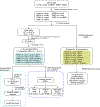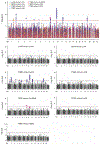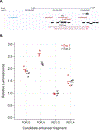Case-Case Genome-Wide Analyses Identify Subtype-Informative Variants That Confer Risk for Breast Cancer
- PMID: 38832928
- PMCID: PMC11293972
- DOI: 10.1158/0008-5472.CAN-23-3854
Case-Case Genome-Wide Analyses Identify Subtype-Informative Variants That Confer Risk for Breast Cancer
Abstract
Breast cancer includes several subtypes with distinct characteristic biological, pathologic, and clinical features. Elucidating subtype-specific genetic etiology could provide insights into the heterogeneity of breast cancer to facilitate the development of improved prevention and treatment approaches. In this study, we conducted pairwise case-case comparisons among five breast cancer subtypes by applying a case-case genome-wide association study (CC-GWAS) approach to summary statistics data of the Breast Cancer Association Consortium. The approach identified 13 statistically significant loci and eight suggestive loci, the majority of which were identified from comparisons between triple-negative breast cancer (TNBC) and luminal A breast cancer. Associations of lead variants in 12 loci remained statistically significant after accounting for previously reported breast cancer susceptibility variants, among which, two were genome-wide significant. Fine mapping implicated putative functional/causal variants and risk genes at several loci, e.g., 3q26.31/TNFSF10, 8q22.3/NACAP1/GRHL2, and 8q23.3/LINC00536/TRPS1, for TNBC as compared with luminal cancer. Functional investigation further identified rs16867605 at 8q22.3 as a SNP that modulates the enhancer activity of GRHL2. Subtype-informative polygenic risk scores (PRS) were derived, and patients with a high subtype-informative PRS had an up to two-fold increased risk of being diagnosed with TNBC instead of luminal cancers. The CC-GWAS PRS remained statistically significant after adjusting for TNBC PRS derived from traditional case-control GWAS in The Cancer Genome Atlas and the African Ancestry Breast Cancer Genetic Consortium. The CC-GWAS PRS was also associated with overall survival and disease-specific survival among patients with breast cancer. Overall, these findings have advanced our understanding of the genetic etiology of breast cancer subtypes, particularly for TNBC. Significance: The discovery of subtype-informative genetic risk variants for breast cancer advances our understanding of the etiologic heterogeneity of breast cancer, which could accelerate the identification of targets and personalized strategies for prevention and treatment.
©2024 American Association for Cancer Research.
Conflict of interest statement
Conflicts of interest
The authors declare no potential conflicts of interest
Figures




References
-
- Anderson BO, Ilbawi AM, Fidarova E, Weiderpass E, Stevens L, Abdel-Wahab M, et al. The Global Breast Cancer Initiative: a strategic collaboration to strengthen health care for non-communicable diseases. Lancet Oncol 2021;22:578–81 - PubMed
-
- Spitale A, Mazzola P, Soldini D, Mazzucchelli L, Bordoni A. Breast cancer classification according to immunohistochemical markers: clinicopathologic features and short-term survival analysis in a population-based study from the South of Switzerland. Ann Oncol 2009;20:628–35 - PubMed
-
- Reis-Filho JS, Weigelt B, Fumagalli D, Sotiriou C. Molecular profiling: moving away from tumor philately. Sci Transl Med 2010;2:47ps3 - PubMed
-
- Zardavas D, Irrthum A, Swanton C, Piccart M. Clinical management of breast cancer heterogeneity. Nat Rev Clin Oncol 2015;12:381–94 - PubMed
-
- Hammond ME, Hayes DF, Dowsett M, Allred DC, Hagerty KL, Badve S, et al. American Society of Clinical Oncology/College Of American Pathologists guideline recommendations for immunohistochemical testing of estrogen and progesterone receptors in breast cancer. J Clin Oncol 2010;28:2784–95 - PMC - PubMed
MeSH terms
Grants and funding
- R01DK128615/National Institute of Diabetes and Digestive and Kidney Diseases (NIDDK)
- P30 ES010126/ES/NIEHS NIH HHS/United States
- R21 CA234752/CA/NCI NIH HHS/United States
- R01 CA097397/CA/NCI NIH HHS/United States
- P30 CA008748/CA/NCI NIH HHS/United States
- U01CA083178/National Cancer Institute (NCI))
- U01 CA083178/CA/NCI NIH HHS/United States
- R01CA202981/National Cancer Institute (NCI)
- R01 CA129639/CA/NCI NIH HHS/United States
- R01CA235553/National Cancer Institute (NCI)
- R00 CA230205/CA/NCI NIH HHS/United States
- R01 CA235553/CA/NCI NIH HHS/United States
- P30 CA086862/CA/NCI NIH HHS/United States
- R00CA230205/National Cancer Institute (NCI)
- P30CA008748/National Cancer Institute (NCI)
- R21CA234752/National Cancer Institute (NCI)
- R01 CA202981/CA/NCI NIH HHS/United States
- R01 DK128615/DK/NIDDK NIH HHS/United States
LinkOut - more resources
Full Text Sources
Medical

